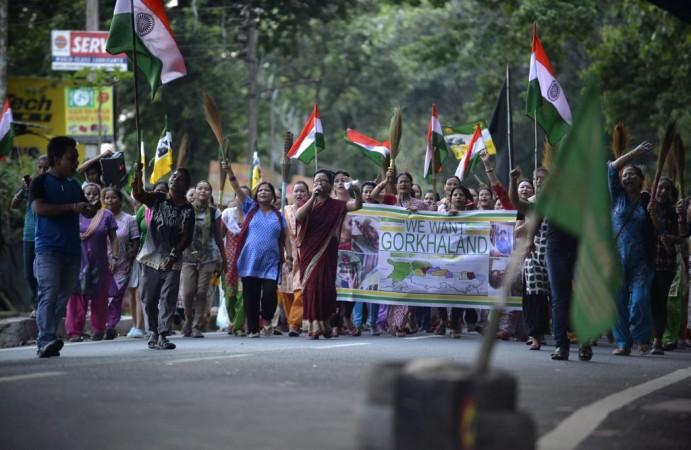
It is the 43rd day of strike in the Darjeeling Hills. It is a gloomy day with rain drops spluttering, shops closed and police vehicles and armed police personnel marshalling the streets. The town, nestled in the lap of Himalayas, has forgotten its smile with the West Bengal government and CM Mamata Banerjee treating the residents of 'Queen of Hills' as second-class citizens.
There have been gross violations of human rights in the small town, which is miles away from Kolkata, the capital of the state. Is anyone bothered? No one, besides the Gorkha community, has highlighted the atrocities ever since the demand of statehood sprung back to life after a few years of calmness.
Indian democracy received it first bullet when three unarmed protesters were shot by police personnel on June 17. One could not understand such use of bullets, when the Tricolour was used widely during the protest, signalling their love for the homeland, India. One needs to understand that the right to peaceful protest is a fundamental one.
Anti-nationals in the valley are treated with rubber bullets but in Darjeeling, it was met with real bullets. People of Darjeeling want to be separated from West Bengal only and not from India. The response of the WB govt to it is not justified.
After that blood-chilling incident in mid June, Internet services in the hills were suspended, too. It has been more than 40 days that the people of Darjeeling have been banned from using the Internet, which is another violation of human rights.
Even the UN does not permit such act. The United Nations Human Rights Council (UNHRC) passed a resolution condemning Internet access last year. One of the main reasons for UNHRC coming up with this is the way governments around the world are banning Internet to serve their own whims. That is exactly what is happening in Darjeeling.
Clamping down of Internet is not something new in India, as it has happened in the past as well. In 2016, there were 30 internet shutdowns in the country leading to a loss of Rs 6,000 crore, as per a report published by Washington DC based Brooking Institute. The parameters of when and under what situation can the Internet be brought down should be seriously looked into.
One needs a strong reason for Internet to be banned for such a long time. It is understandable if the ban might have taken place when the situation looked tense (mid-June), but even when law and order condition became stable, telecom companies were asked to comply with the order.

As a result, it is the students of the area, who have been left in the cold. Without Internet, they have not been able to apply for higher education in major parts of the country. They cannot fill up their admission forms. Some of the people's salaries did not reach them as it comes online.
In the context of India, banning of internet can be called unconstitutional as Article 19 grants the citizen of the country freedom of speech and expression. Without Internet, people in Darjeeling could not express their opinions on Facebook, Twitter etc. Internet ban seemed to be a tool used by the WB govt in Darjeeling to hide government's atrocity.
However, this is not the end of it. The basic right to life (Article 21) can also be questioned in the hills. For anyone's survival, food is one of the most important elements, but even that has been blocked.
How?
With Darjeeling depending on the plains (mostly Siliguri) for food and other essential supplies, the West Bengal Police were not doing much when trucks or any other vehicle carrying food were stopped by the miscreants, according to sources. There are videos on Facebook (thank God for internet), making the same evident.
People in Darjeeling, hence, are dependent on the local produce to keep their chants of 'Jai Gorkha , Jai Gorkhaland' alive.
Even the freedom of press has been taken for granted in Darjeeling, with local channels being asked to stop their broadcast. Recently, Nepali news channel ABN Network, which operates from Siliguri, was also shut down on charges of dirupting peace and harmony. This was the final nail in the coffin of democracy as the state government managed to shut one of the doors of truth in Darjeeling. Isn't media the fourth pillar of democracy?
@narendramodi @smritiirani @rajnathsingh @AmitShah
— SS Ahluwalia (@SSAhluwaliaMP) July 23, 2017
Please intervenehttps://t.co/uYta26TR6D
. pic.twitter.com/RdAd3nbOpz
Despite the suppression, the Gorkhas, however, have not given up, not lost hope for they are a race, who have gone the full distance in wars for India. In fact, such kind of inequity has turned this fight for Gorkhaland into an even stronger people's movement, where unity has given them the courage and zeal to fight for separation from West Bengal till their last breath.
However, what upsets them most is silence of human rights activists on the violation of basic human rights. Particularly, the Centre's silence makes people in the hills wonder in what ways the world's biggest democracy is indeed helping them out at this moment of crisis.








